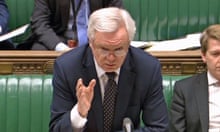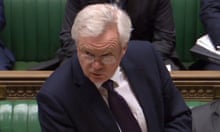The government has conceded that it must share dozens of previously confidential documents assessing the economic impact of Brexit after Labour won a Commons motion demanding their release.
After Wednesday evening’s unanimous vote calling for the 58 studies to be released, ministers refused to confirm whether the arcane type of motion passed unanimously by MPs, known as a “humble address”, was considered binding.
But answering questions in the Commons on Thursday, the leader of the house, Andrea Leadsom, said this was the case. However, she indicated that there could be some delays as ministers pondered how to release the information without damaging Brexit negotiations.
“It is absolutely accepted that the motion passed by the house yesterday is binding, and that the information will be forthcoming,” she said. “But as I think has been made very clear, it is the case that it’s difficult to balance the conflicting obligation to protect the public interest through not disclosing information that could harm the national interest, whilst at the same time ensuring that the resolution that the house passed yesterday is adhered to.”
The Labour motion, tabled by the shadow Brexit secretary, Keir Starmer, calls for the full, unredacted impact assessments to be passed to the Brexit select committee, which would decide what elements could be released more widely.
Earlier on Thursday, Robin Walker, the junior Brexit minister, said talks had already begun between his department and the chair of the Brexit committee, Labour MP Hilary Benn, on the next steps.
“We take very seriously the motion of parliament, we will be responding to it,” Walker told MPs. “The secretary of state has already spoken to the chairman of the select committee of exiting the European Union and will be discussing this matter with him further in due course.”
Benn later wrote to Davis asking him to “confirm in writing as soon as possible the arrangements that you are making to give effect to this decision”.
In the letter, Benn told Davis he would happily discuss what sections might be sensitive once the reports had been sent to the committee.
Labour has sought for months to secure the release of the studies, which cover the great majority of the UK economy, prompting speculation that ministers were wary of sharing them because of the gloomy assessments they contain.
The motion was passed unanimously after the government said it would not oppose the measure, a tactic it has taken several times recently to ward off likely rebellions by Tory MPs supporting Labour motions.
However, while normal opposition day motions can be ignored by the government without consequence, the measure seeking release of the papers was tabled as a humble address, an arcane parliamentary request rarely used since the 19th century.
The Speaker, John Bercow, said such motions were “traditionally regarded as binding or effective”, but said he could not immediately rule whether ministers would be judged in contempt of parliament if they did not act.
Starmer, who tabled the motion, said after the vote that he expected ministers to release the studies. “Labour has been absolutely clear since the referendum that ministers could not withhold vital information from parliament about the impact of Brexit on jobs and the economy,” he said.
“It’s completely unacceptable for the Tories to have wasted months avoiding responsible scrutiny and trying to keep the public in the dark. The reality is that it should not have taken an ancient parliamentary procedure to get ministers to listen to common sense.”
During the debate, Starmer argued that passing the papers initially to the Brexit select committee would be a prudent approach, not least as it has a majority of Conservative MPs, despite being chaired by a Labour member.
Responding to Starmer, Walker said the government was wary of releasing “unvarnished” advice in case it prompted future documents to be written in less frank terms. .
Release of the documents was backed in the debate by several Tory MPs, including the pro-Brexit Jacob Rees-Mogg as well as other rebels such as Anna Soubry and Sarah Wollaston.
In her contribution to the debate, Soubry took aim at diehard Brexiters on her own side, who she said had to get serious about the process. “You’ve won, you’re in charge of this, now you have to face up to the responsibility of delivering a Brexit that works for everybody in this country and for generations to come,” she said.
Soubry added that some of those opposed to releasing the studies seemed mainly worried about what they contained, saying: “The implication is quite clear: there’s something in them that’s not to be disclosed because it might prick this golden bubble, this balloon, of the promised land of Brexit.”








